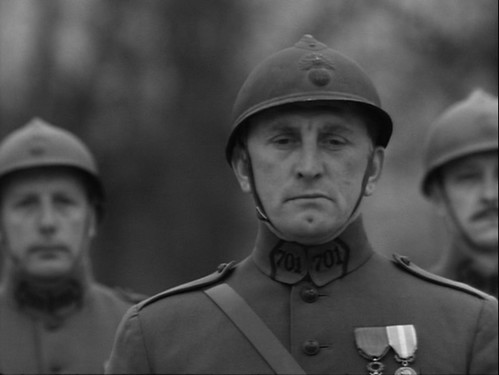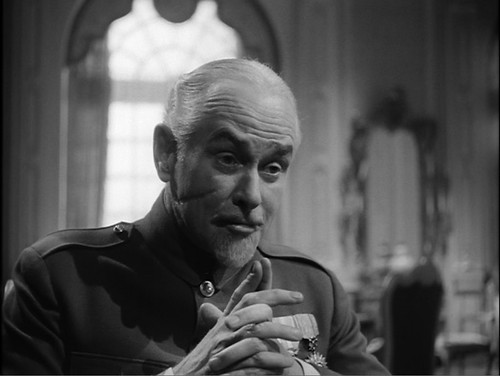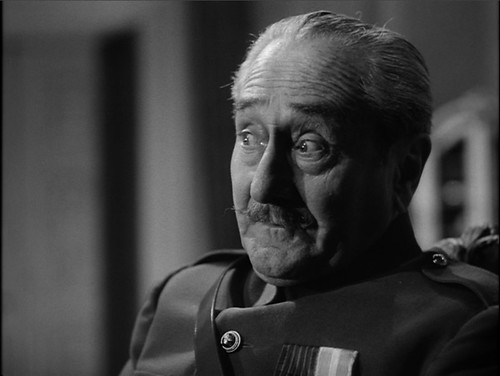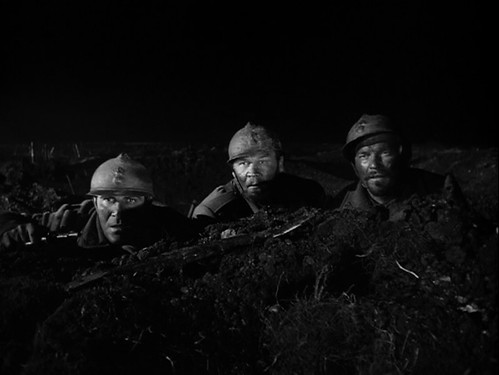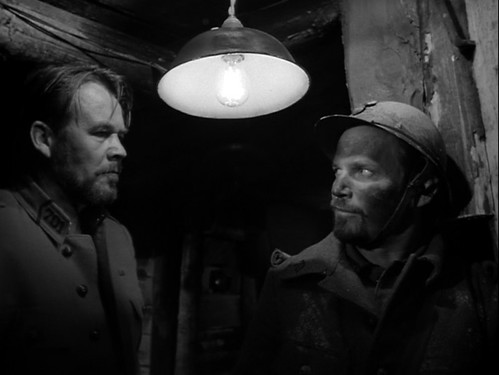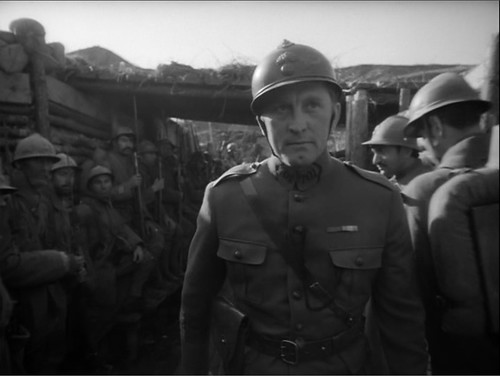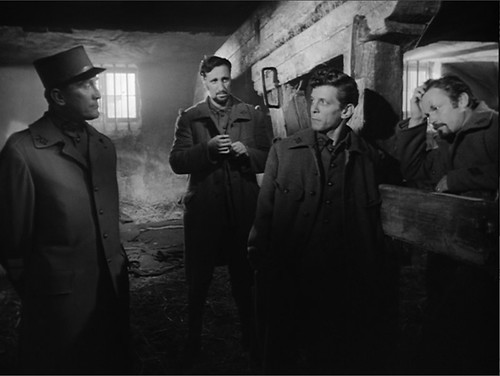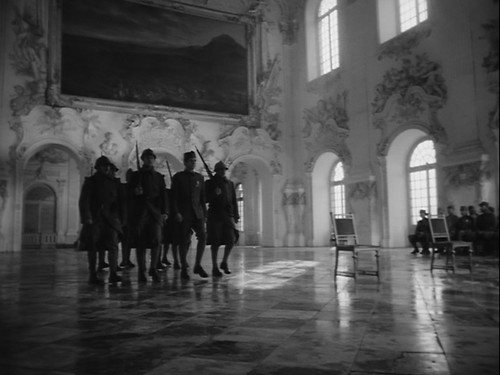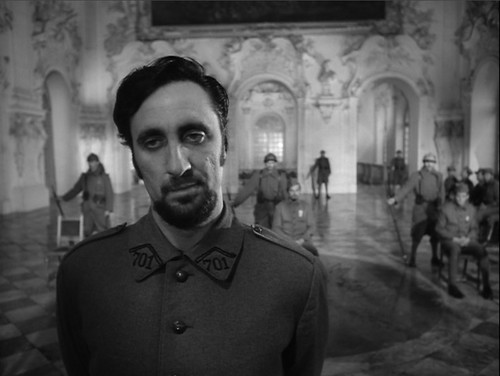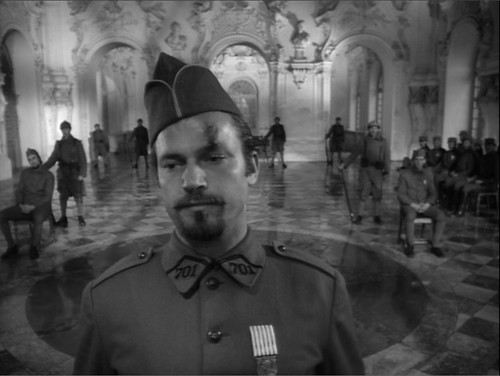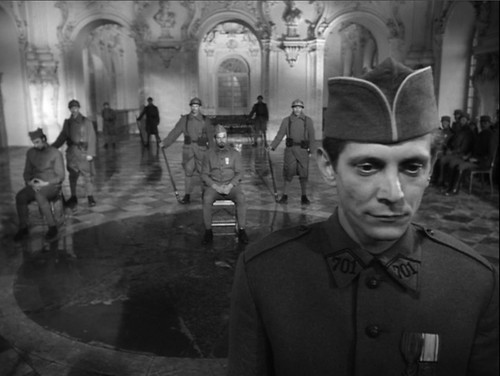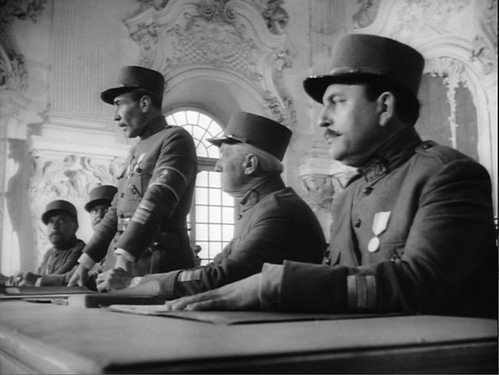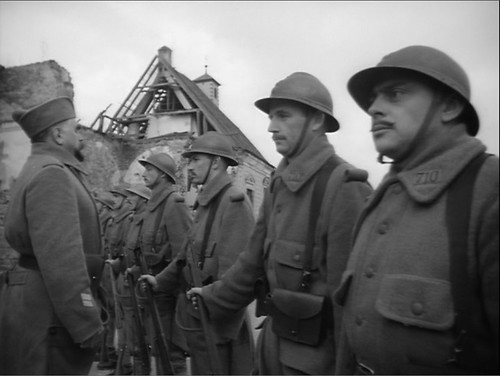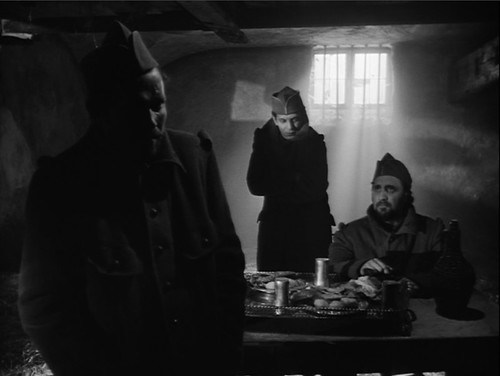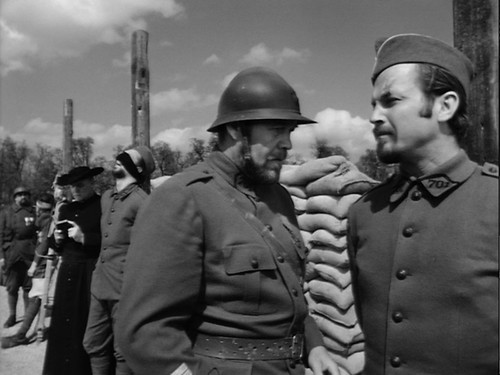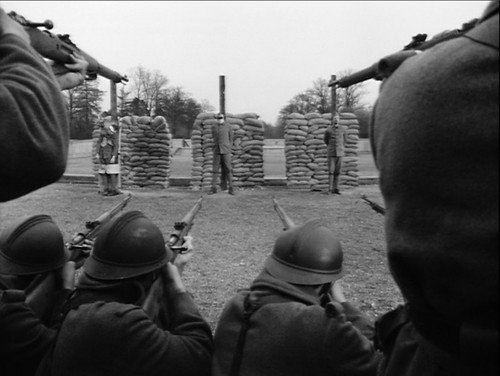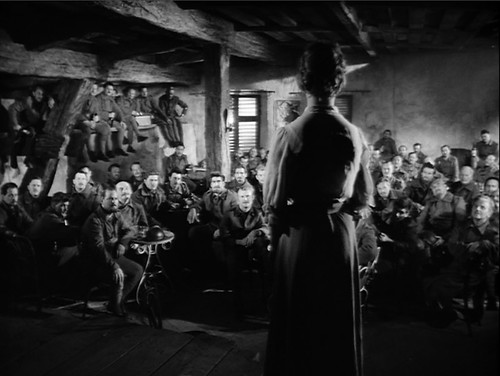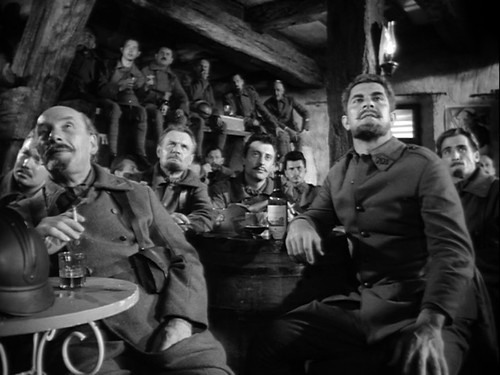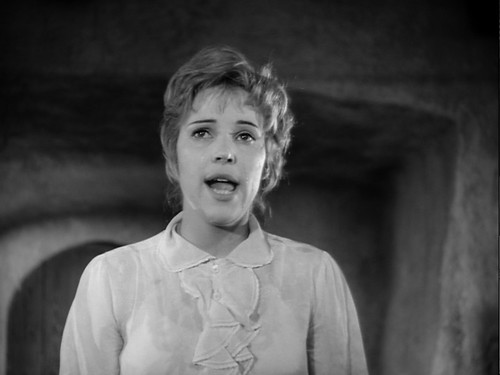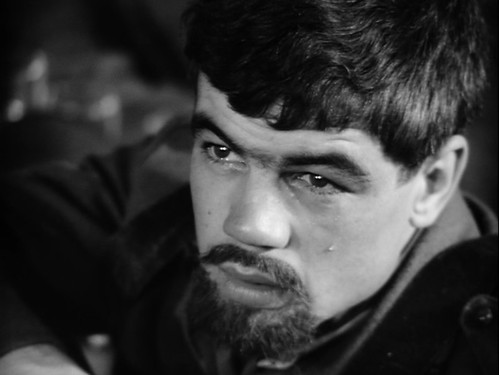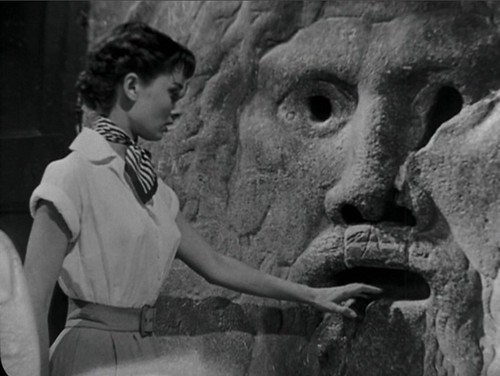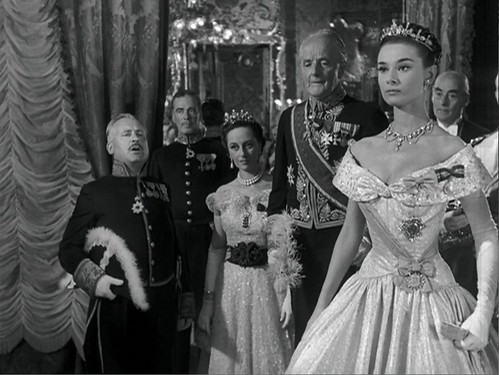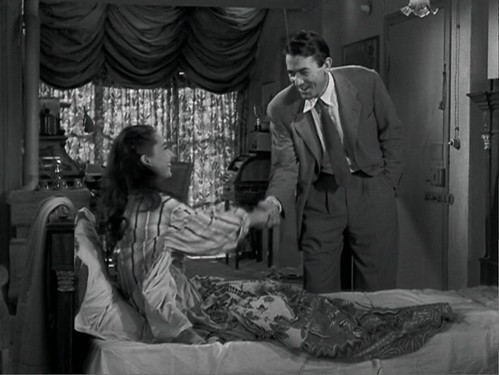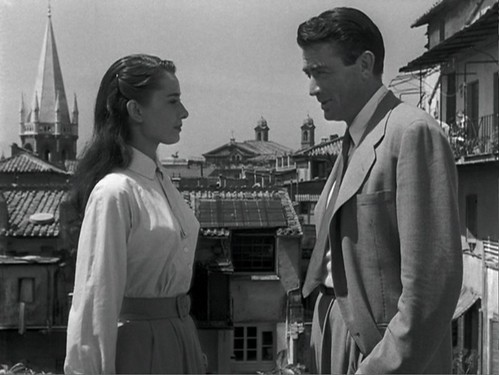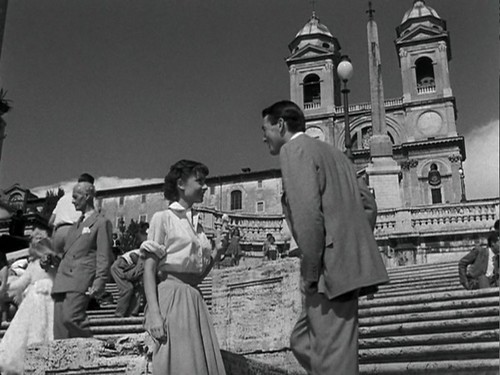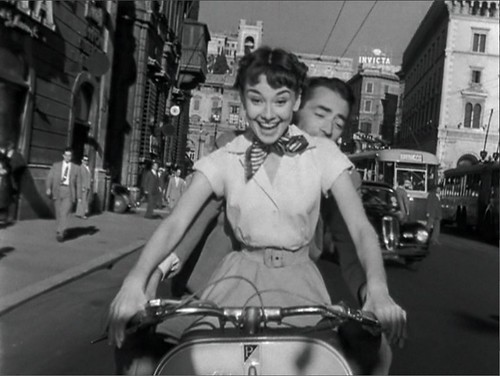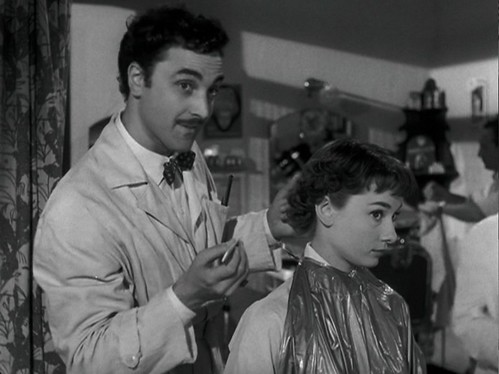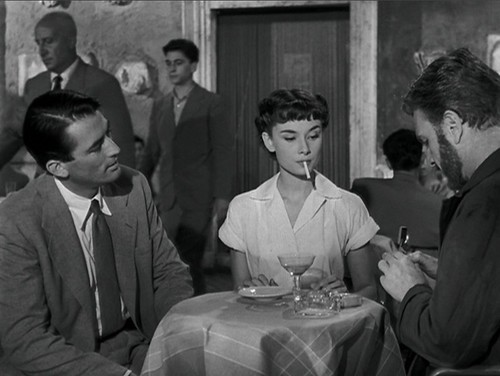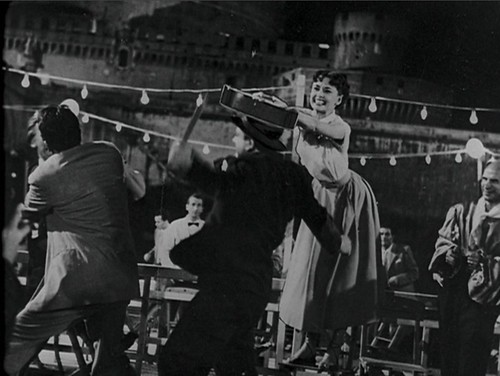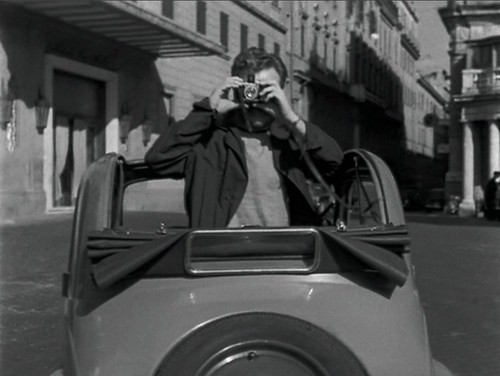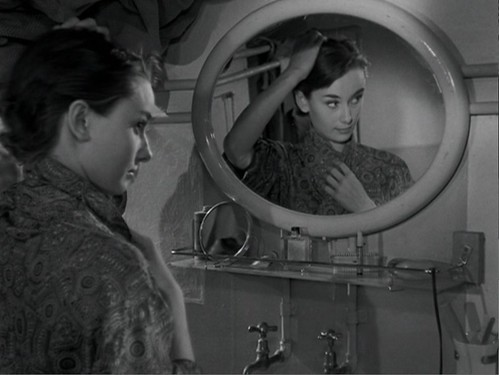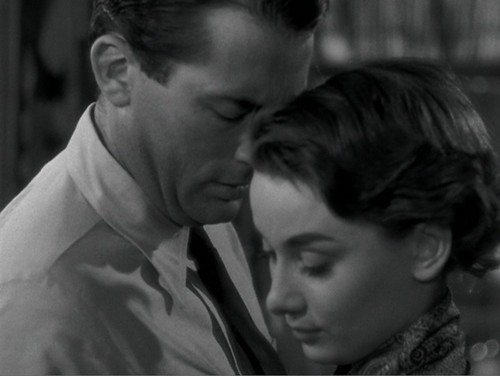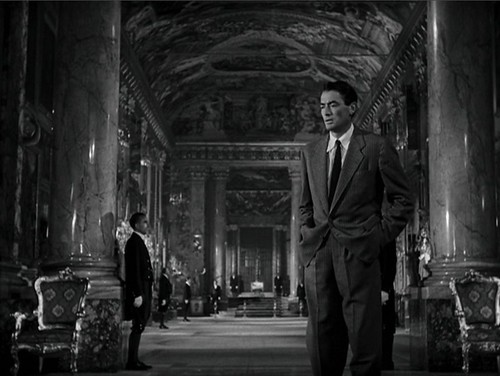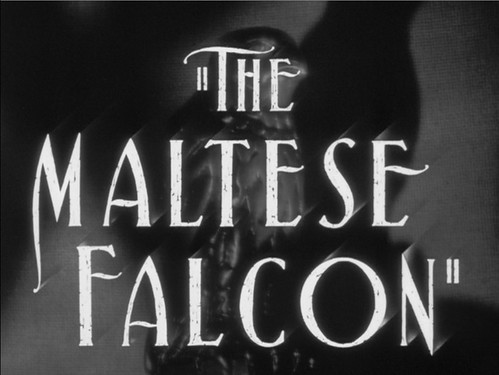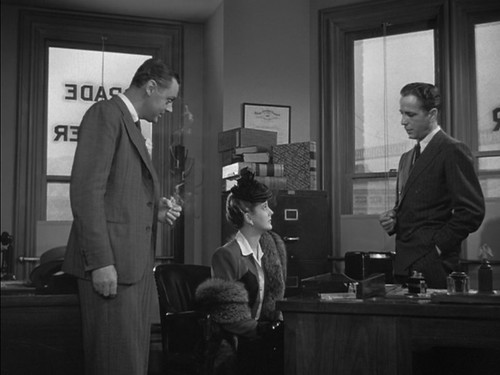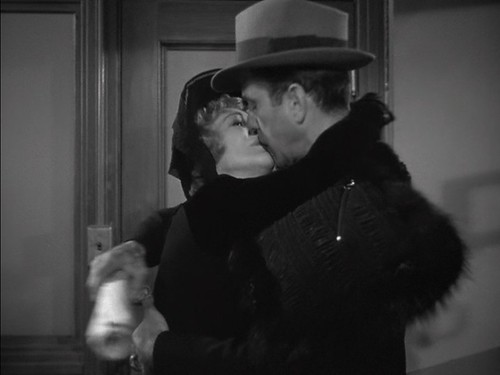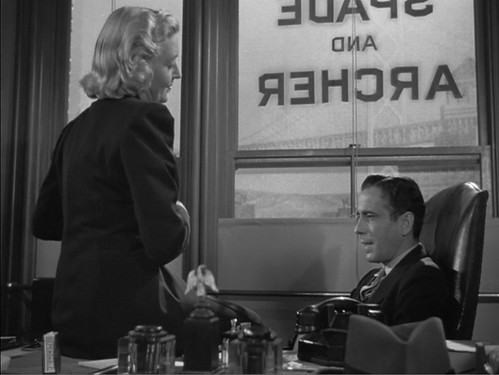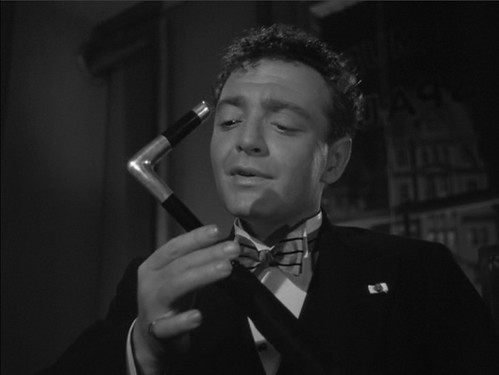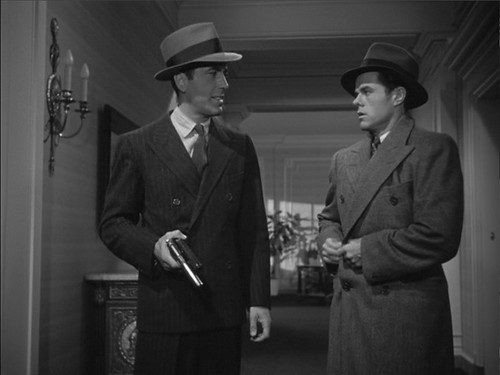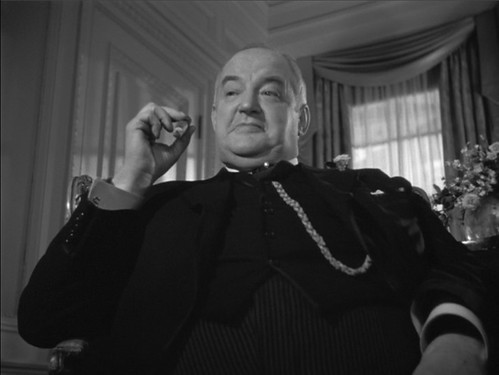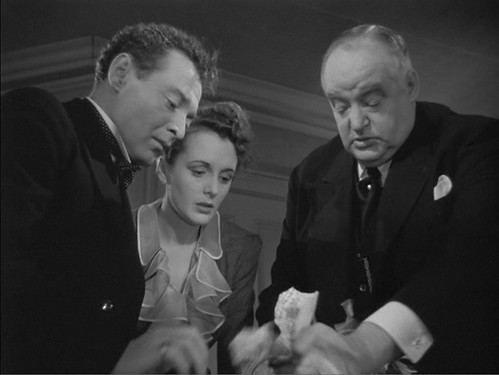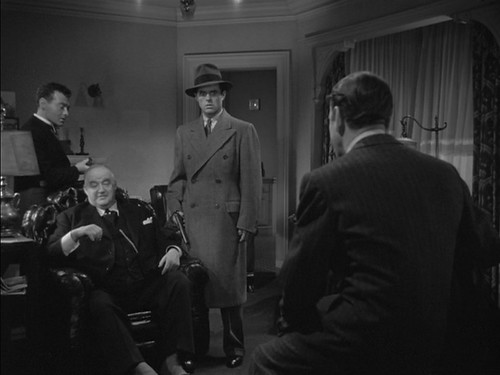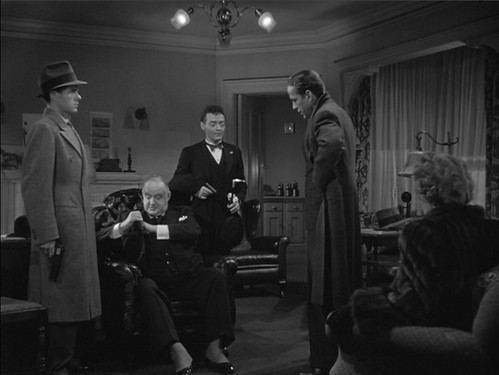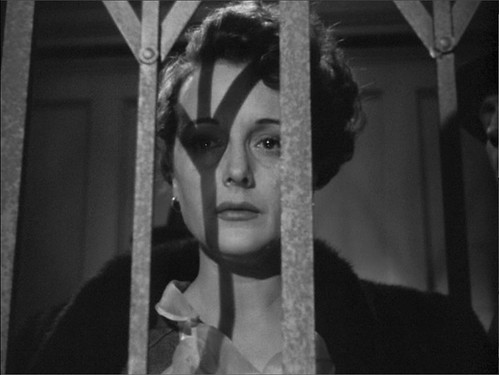There are spoilers for Paths of Glory and one small spoiler for Barry Lyndon.
Director: Stanley Kubrick
Screenplay: Stanley Kubrick, Calder Willingham and Jim Thompson
Starring: Kirk Douglas, Ralph Meeker, Adolphe Menjou, George Macready, Wayne Morris, and Richard Anderson
Images from the 1999 MGM release.
Stanley Kubrick's Paths of Glory is possibly the most affecting film experience I've ever had. I admit that I once thought everything Kubrick did was genius and each film an absolute masterpiece. I've probably gone over his readily available films more than any other director. As my experience has changed, some have grown in my mind more than others, and I no longer make blanket statements about his oeuvre. There are three of his films that I cannot decide upon which is the greatest, and if I were to make a list for the Sight & Sound poll, I could put any one of them on it. These three would be Paths of Glory, 2001: A Space Odyssey, and Eyes Wide Shut.
I can only think of one other film at the moment that has as much emotional resonance as Paths of Glory, and that film is Robert Altman's Nashville. I find that film endlessly fascinating and it too, could go on my Sight & Sound list. But I'll save that for a later post.
Paths of Glory tells the story of a failed French attack on the fictional German-controlled "Ant Hill." The generals arrange a court marshall indicting three men to be executed as an example for cowardice in the face of the enemy. The film is one of the great examinations of war as well as the hierarchal structure of the military and the ideas of subordination.
The film opens with the Marseillaise, which was used in Casablanca, but here, it serves not to rally us in unity and patriotism, but to question the ideas of unity and patriotism, and to what extent they can exist selflessly. However, Paths of Glory is not opposed to the ideals of Casablanca so much as cautious of accepting declarations of patriotism. It is a warning that utilizes themes throughout much of Kubrick's work. The one that sticks out the most for me is the idea that culture does not elevate us to nobility. Paths of Glory expresses these notions throughout the chateau scenes, where the generals calmly discuss strategies like a chess game. General Mireau (George Macready) is ordered by General Broulard (Adophe Menjou) to order his men to take the strategic position known as the Ant Hill. I find these scenes particularly sinister, and Mireau's scar certainly helps.
When I look at Mireau, I wonder where he got that scar. Was it in battle? Or did he obtain it in a more questionable manner? Perhaps he's trying to look "battle worn?" In a lesser film, I feel we would have gotten a flashback or a story telling us where he got it and why it made him the man he is today. Paths of Glory is a wisely simple film, and because of that, it's messages are strong and concise. There are few films as economical and as effective as Paths of Glory.
One of the important ideas that Paths of Glory tackles is the military hierarchy. Mireau, after all, isn't even the top of the food chain. He is ordered by General Broulard, who has even less screen time than Mireau. Of course, Broulard has his orders too, however we never see or hear about these faceless leaders.
The scenes of the trenches have that indelible Kubrick stamp, with Mireau surveying the men and asking them all the same question: "Ready to kill more Germans?" The trenches really are a perfect allegory for war as a means of dehumanizing the enemy. I will discuss this more in the final scene, which is one of three perfect scenes I can think of in the film. Kubrick's films always feel like they belong in a different universe than ours, yet the problems faced are exactly the same, only amplified.
War films always have a knack for instilling fear and dread, and the reconnaissance scene is chilling. In the scene, Lieutenant Roget (Wayne Morris), Corporal Philippe Paris (Ralph Meeker) and Private Lejeune scout amidst no man's land into German territory. There is a moment where a flare is shot, and to me, it was like it kicked open my mind to the horrors of war as we see the ground strewn with the bodies of men. Adding to this is Roget's cowardice, who inadvertently tosses a grenade in panic... and kills his own man, Lejeune.
And what does Roget do when he abandons Paris?
Why, look how clean he is! It's like he just took a bath...
Flaws of superiority on the small scale, as well as the large scale are evident throughout Paths of Glory, and the film wisely does not convey a continually escalating blackguarded sense as we rise in the ranks. Just as I find excessive naivete and bliss difficult to tolerate, I cannot easily sit through films that suck out any glimmer of hope. Paths of Glory does not tag everything as horrible, which is part of the reason I'm not particularly fond of A Clockwork Orange. Then again, Ace in the Hole is one of the darkest films I've seen and it's one of my favorites.
Speaking of which, I think Paths of Glory and Ace in the Hole prove just how capable Kirk Douglas is. He's a bit like Humphrey Bogart in that regard, who was also willing to play unsympathetic sons of bitches.
Douglas plays Colonel Dax, who isn't the top man, and it's quite evident that the further you are from the battlefield, the more of a scoundrel you are. As Dax tells Mireau:
"Patriotism is the refuge of scoundrels."
In general, the higher up the officer, the bigger the bastard. I watched Robert Altman's M*A*S*H today, and there's that same criticism of hierarchy. Of course, M*A*S*H is a satirical piece, and for the most part belittles the influence of commanding officers. Paths of Glory, on the other hand, emphasizes this influence.
Colonel Dax gives me hope for humanity, and it makes it that much better that he is benevolent without being morbidly pious (unlike Frank Burns in M*A*S*H).
Although the first half of Paths of Glory is absolutely brilliant, it pales in comparison to the second half, which has three perfect scenes. The first of these, in my mind, is the court marshall. Set in the picturesque chateau, it is the perfect place for Kubrick to convey one of his favorite ideas: that culture fails to elevate us to any real nobility. After all, Hitler himself collected artworks and once aspired to become a painter. In the establishing shot, for instance, we get the prisoners being escorted to the trial:
Above them is this massive painting. Giant paintings and other art in the hands of cultured scoundrels are also found in A Clockwork Orange, Barry Lyndon, and Eyes Wide Shut. This notion of art as being incapable of justifying our civility is one of Kubrick's ideas that resonates strongly with me, perhaps because it strikes so close to the bone. I can't help but feel guilty when I watch films like this. It's almost like I feel that watching war films and being aware of the horrors of war is enough to appreciate what millions of men lost their lives for.
There are three men who are selected to be made examples of. Each is selected a different way, none of which are "fair." However, I do not believe there is a fair way to pick any man at all, given that the order itself is unjust. The first of these men is Private Ferol (Timothy Carey), who is picked on the basis of being a "social undesirable."
Like most people (I hope), I am adverse to any form of prejudice, and choosing a man to die simply because he's a misfit is as wrong as how Corporal Paris is picked. Lieutenant Roget picks Paris as a means for saving his own skin, which of course, parallels Mireau's own form of covering up his misdeeds. At the very heart of Paths of Glory's attack on hierarchy is protecting one's reputation first and foremost as a means of fulfilling personal interest. This is the "path to glory" that the title implies.
So if picking a man to die out of prejudice, spite or self interest is wrong, is there anything that comes close to "fair?" I don't believe there is a definitive answer to that, but I would say no. The "fairest" is by chance, and this is how Private Arnaud is picked. I suspect most people would say being picked by chance is the fairest way... unless you are the one being picked.
The random expendability of men in times of war is equally evident in Barry Lyndon during the small "skirmish" during which Captain Grogan dies and both armies basically march toward the other and fire randomly at the enemy.
A short digression:
Deciding on a near perfect movie is entirely subjective, though there are precious few that I'd add to the list. The one that comes to mind most frequently is Rear Window. That particular movie just doesn't get old, and actually grows in fascination. I may add Rashomon as well as La Dolce Vita because they too, seem to get better with each successive viewing. After watching Paths of Glory for probably the 6th time, I think I can add it to the list. The strange thing is that I was impressed, but not blown away by it the first time. I think it's a bit odd, but I find that the films that hold up best with multiple viewings don't necessarily have a strong impression on the first viewing. Is that just my changing experience in the world of film? I'd say my first impressions of Barry Lyndon and Dr. Strangelove, for example, were much stronger than Paths of Glory, but since then, it has risen to the top.
And back on topic:
When Howard Hawks was asked what makes a great film, he said:
"Three great scenes, no bad ones."
Paths of Glory is near perfect for me because I cannot find a single shot, much less a scene, that doesn't have some purpose or effect. Stanley Kubrick's films all have a strong visual component, which is possibly why he's so revered among filmic circles. Of course, visuals alone are not enough to make a film great, and I am wary of saying I like all his films even though I admire them. Paths of Glory, in particular, stands out in my mind as having a clear visual presentation. Such as the first trench scene with the low angle tracking shot that is characteristic of many Kubrick films.
At the end of the court marshall in particular, is a concise visual comparison between the judges for the trial and the execution squad:
Image comparisons like these work in the purest sense of cinema. I've said before that I'm not a fan of exposition for the most part, and the visuals achieved in Paths of Glory are more poetic than any amount of verbal narration.
It's funny how viewing two films in the same day at random can draw some nice comparisons. For instance, M*A*S*H and Paths of Glory both have a "last supper" scene and while the former is amusingly stagey, the latter is decisively more raw and de-glorifies the sanctimonious air of the old story. Like M*A*S*H, I find Paths of Glory does have a very dark humor to it, although much more minimal.
There is, of course, the famous scene where Paris says:
"Tomorrow we'll be dead and that cockroach will still be alive. It'll have more contact with my wife and children than I."
To which Private Ferol squishes it and says: "Now you've got the edge on him."
The other one that comes to mind is where Arnaud rejects the notion of absolution and embraces his wine bottle and recites:
"This is my religion. Oh, Great Bottle, forgive me my sins, for now I lay me down to sleep. Bo-peep. May I drink of you first? Thank you. Amen."
The second scene that I find perfect is the execution. Droning on and on about every single shot would not do it justice, I think. Each man dies in a different manner, and they make me wonder just how I will go myself. There is Ferol, who earnestly and openly doesn't want to die, and is consoled by the priest. I think it would be too easy to read this simply as "faith is for the cowardly." While I am not at all religious, I feel that the way each man deals with death is understandable. The blindfold around Ferol is as much a shield as it is an indication of fear. The term "blind faith" comes to mind, and not necessarily in a pejorative sense. Faith, to me, is simply another way of coping with problems in life.
One of the more gratifying scenes is where Colonel Dax orders Roget to oversee the execution. I wonder whether I'm entirely justified in finding that so satisfying. If a man is earnestly unwilling to kill a man, this means he's not entirely heartless. Or is he simply afraid of guilt? I do not believe the two are mutually exclusive. Yes, he may be trying to preserve his own conscience, but doesn't that indicate compassion to some degree? Roget obviously deserves more punishment than Paris, but even an inkling of respect for another human being's right to live makes it feel wrong to enjoy Roget's duty as executioner.
Paris faces his death with a straight face, and when Roget apologizes, I again get a sort of mixed gratification from it.
Private Arnaud is unconscious and tied to a stretcher, having been knocked out the night before. For me, it is the final nail in the coffin exposing the absurdity of military punishment.
I think Paths of Glory carries lots of similarities to Dr. Strangelove, but I feel Paths of Glory is the superior film, both thematically and emotionally. Dr. Strangelove feels decisively more apocalyptic, giving a final conclusion that we will end up in nuclear holocaust. For me, the ending of Paths of Glory is more affecting and dark, not only because it is more realistic, but because it indicates no end whatsoever to the cycles of war and the internal struggles for power.
The last scene is one of the most emotionally affecting scenes I've seen in part because it works on so many levels. It begins with a bar full of half-drunk French soldiers jeering and taunting the "latest acquisition from the enemy," a young German woman clearly terrorized. The host at the bar appropriately calls her:
"A little pearl washed ashore, by the tide of war."
As she cries, she begins to sing, at first inaudible amongst the cacophony of male banter. As this fragile and wavering voice soars above the catcalls and whistles, the men gradually fall silent. It is in this moment that they realize this "pearl" is the so-called enemy... this human being, so fragile and scared is the one they've been fighting. They have lost sight of the humanity in the enemy, and it is this that moves them. As they slowly join in song, a silver lining appears amidst the darkness of this film. Although war is terrible and millions of people die, there is always the hope that we will not lose sight of the "enemy's" humanity.
